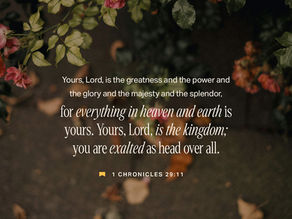Colossians 2:13-17 - Shadow Law
- Chad Werkhoven
- Aug 5, 2024
- 4 min read
Which of God's laws are you obligated to keep?
Colossians 2:13-17 (NIV)
13 When you were dead in your sins and in the uncircumcision of your flesh, God made you alive with Christ. He forgave us all our sins, 14 having canceled the charge of our legal indebtedness, which stood against us and condemned us; he has taken it away, nailing it to the cross. 15 And having disarmed the powers and authorities, he made a public spectacle of them, triumphing over them by the cross.
16 Therefore do not let anyone judge you by what you eat or drink, or with regard to a religious festival, a New Moon celebration or a Sabbath day. 17 These are a shadow of the things that were to come; the reality, however, is found in Christ.
Listen to passage & devotional:
Belgic Confession of Faith, Article 25: The Fulfillment of the Law
We believe
that the ceremonies and symbols of the law have ended
with the coming of Christ,
and that all foreshadowings have come to an end,
so that the use of them ought to be abolished
among Christians.
Yet the truth and substance of these things
remain for us in Jesus Christ,
in whom they have been fulfilled.
Nevertheless,
we continue to use the witnesses
drawn from the law and prophets
to confirm us in the gospel
and to regulate our lives with full integrity
for the glory of God,
according to his will.
Summary
How often haven't you looked back on a short encounter you had with someone where an opportunity presented itself to tell them the good news of the gospel, but you didn't quite know what to say? A great way to prepare yourself so that you don't whiff the next time you get the chance is to practice explaining the gospel in a minute or less. This can be done in all sorts of different ways, depending on the context and circumstances.
Paul gives a great example of how to do this in the opening verses of today's passage: when you were dead in your sins, God made you alive in Christ by cancelling your debt as Christ was nailed to the cross. Short, straightforward, and effective. If you can't memorize this passage verbatim, then at least know the gist of it and where to find it when you need it.
Paul gives this short but sufficient gospel recap here to illustrate that all of the previous rules and regulations found in the Old Testament - particularly, the Pentateuch (the first five books of the Bible). Things like kosher food laws, dozens of religious ceremonies and festivals, monthly celebrations and Sabbath restrictions - practices that formed the core of Jewish identity - no longer have relevance for those set free by Christ.
These things, write Paul, were only a shadow of the things that have now been fulfilled by the reality of Christ's all sufficient sacrifice and perfect obedience. In other words, they served as a teaching aide, showing the gap between sinful man and their holy God, and demonstrating how that gap could only be closed by atonement and perfect righteousness.
Dig Deeper
Maybe - and I'm sure this is only true of a tiny percentage of you - maybe you've, just for a moment or two, found yourself bored in church. As the Domine (Dutch word for minister) drowned on and on, you found yourself paging through the Bible and you landed in a book like Leviticus or Deuteronomy in passages in which God conveys rule after rule. Some of them make sense, some seem overly harsh, and others are just plain weird.
Exodus 22 is a good example. In it we read that we must not mistreat foreigners or take advantage of widows and orphans. Sounds good. But in the same passage it says that sorceresses must not be allowed to live, that firstborn male sheep must be sacrificed to the Lord, and that we must not eat the meat of an animal torn by wild beasts. What do we do with that?
In theology, we distinguish God's law into three categories that help us determine how to apply it:
Civil laws: "Serve the purpose of restraining sin and promoting righteousness in society;"
Ceremonial laws: Bring us "under conviction of sin, and make us conscious of our inability to meet the demands of the law. In that way the law becomes our tutor to lead us to Christ." These laws, like the case of the sacrificial sheep in Exodus 22, are the "shadows" Paul referred to that have been fulfilled by Christ.
Moral / Normative laws: "The law is a rule of life for believers, reminding them of their duties and leading them in the way of life and salvation." The quotations above take from Louis Berkhof's Systematic Theology
Conceptually, this isn't difficult, but practically, determining how to categorize and live in conformance to God's law is hugely difficult, and good Christians have been coming to different conclusions for the entire history of the Church.
Over this next week, we'll look at what it is that we as Reformed Christians confess to be true about God's law.
ACKNOWLEDGE WHO GOD IS: Our Father, who made us alive in Christ Jesus;
ALIGN YOUR LIFE WITH GOD'S WILL: Pray for the wisdom to know and discern God's will as it's communicated in His law;
ASK GOD FOR WHAT YOU NEED:
Read the New Testament in a year! Today: 1 Corinthians 5




















Comments